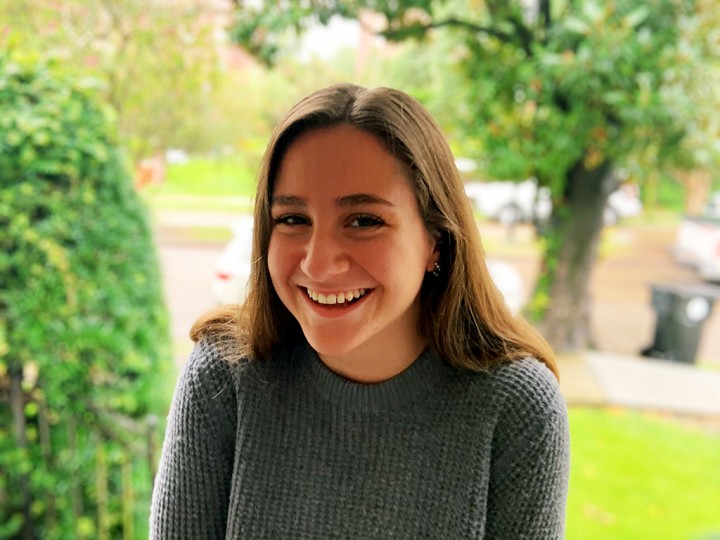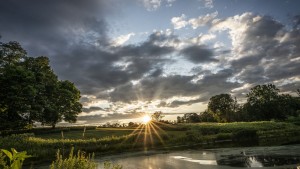After that experience, she went on to intern with Kenyon’s own land trust — the Philander Chase Conservancy (PCC), a unique organization that works to conserve open space and important natural habitats in a five-mile radius surrounding the College. “The people who work at PCC and KNP [the Kokosing Nature Preserve, a green burial cemetery] are so wonderful, so inviting and welcoming, and have given me so many great opportunities,” Gelman said. “So it was a fantastic experience working for them.”
Later on, Gelman found several solar industry internships with the help of the Career Development Office, including one at Intersect Power, a company co-founded by Sheldon Kimber ’99. “I started the job not knowing if I was for sure going to go into solar development,” she said. “Luckily, I ended up absolutely loving it.”
After graduation, Gelman will begin working as a project management analyst at Arevon, a renewable energy company based in Scottsdale, Arizona. Zach Sawicki ’16, a senior project manager at Arevon, has been a mentor to Gelman throughout her time at Kenyon. “Zach has been incredible, always providing helpful advice and insights about the industry,” Gelman said. “I couldn’t think of a better person to start my career with.”
“Solar Power Systems,” a 100-level environmental studies course co-taught by Assistant Professor of Physics and Scientific Computing Eric Holdener and solar expert Jerry Kelly ’96, has launched multiple students into successful solar careers. “I’m so grateful I took it, because it threw me into this industry and really taught me so much about what it means to actually be on the ground,” Gelman said. Although there’s no formal track for students interested in this career path, Holdener and Kelly’s class, plus courses like “Science of Climate Change” and “Geographic Information Science” (GIS), provide a solid foundation.
After that, the Kenyon network of alumni working in solar — like Kimber, Lincoln Bleveans ’89 and a host of more recent graduates finding their footing in the industry — is eager to lend a hand. “Every single alum I’ve talked to has been so fantastic and so happy that I want to go into it,” Gelman said. “Everyone in solar is so passionate about solar, and everyone who goes to Kenyon is so passionate about Kenyon — it just makes sense that they would want to have more Kenyon people in solar.”
Gelman thinks a Kenyon education leads naturally to the skills needed to develop large-scale solar projects, which may cover thousands of acres, produce hundreds of megawatts of electricity and involve a dizzying array of bureaucratic, economic, environmental, legal, regulatory and political challenges. “You have to wear a million hats, make a lot of interpersonal connections and be very flexible in what you’re interested in,” Gelman said. “That is why my Kenyon education is serving me well. I’m looking at policy, but I’m also doing financial analysis, I’m also doing GIS mapping, and all of these things are what helps create a solar project.”
Plus, as the perils of climate change become more apparent every day, and the worldwide transition away from fossil fuels gains momentum, soon-to-be-grads are eager to make a difference immediately. “You can get into renewables and make an impact right away, without going to grad school or doing entry-level grunt work for years. Just start putting panels in the ground,” Gelman said. “Yes, I’m a liberal arts grad; no, I didn’t go to business school. But you can do this, and you can make a greater impact than you think.”
 Ohio’s weather — foggy autumns, snowy winters and rainy springs — is not necessarily associated with sunshine. But despite Gambier’s climate, a growing number of Kenyon students and alumni are discovering the power of the sun and basking in solar power development careers.
Ohio’s weather — foggy autumns, snowy winters and rainy springs — is not necessarily associated with sunshine. But despite Gambier’s climate, a growing number of Kenyon students and alumni are discovering the power of the sun and basking in solar power development careers.